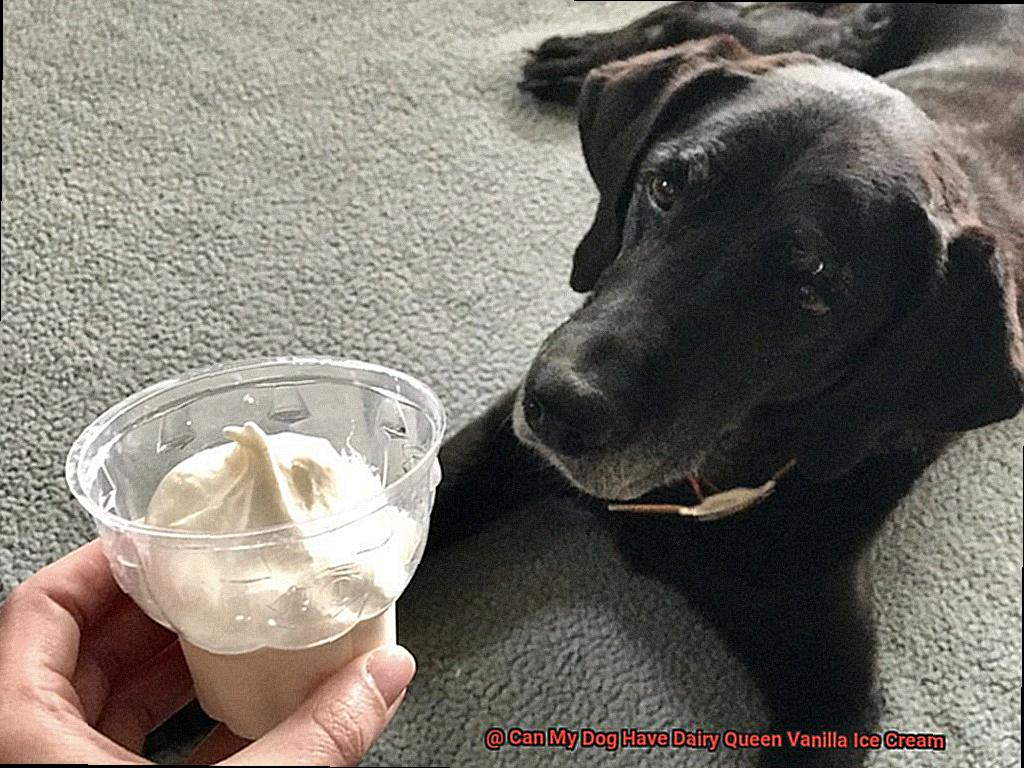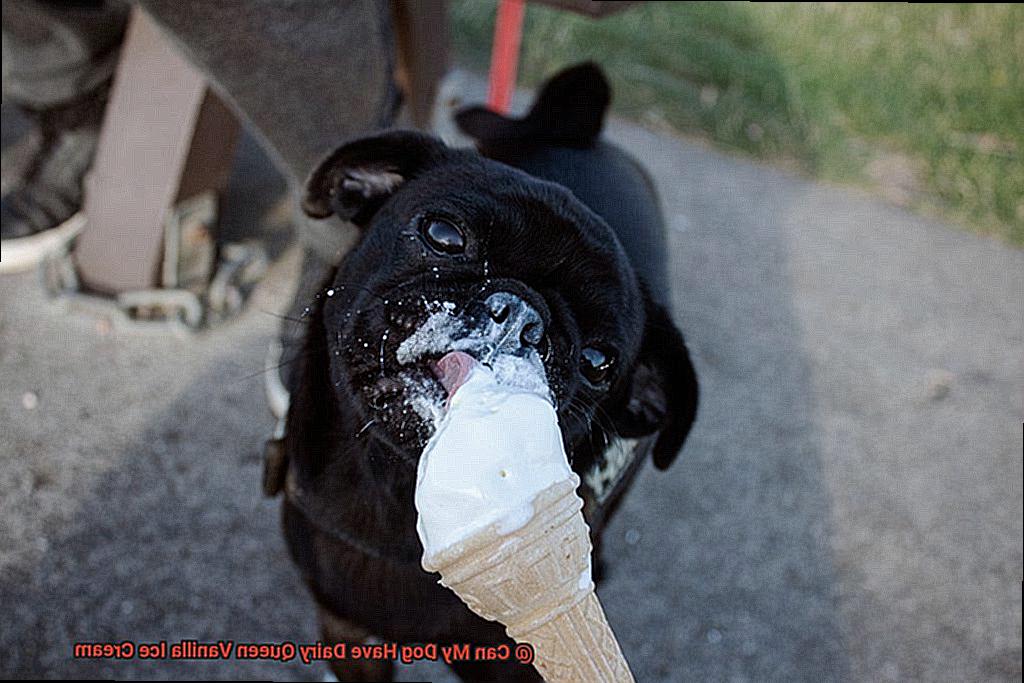Can My Dog Have Dairy Queen Vanilla Ice Cream?
We all know the struggle of resisting a luscious, mouthwatering vanilla ice cream cone from Dairy Queen on a scorching summer day. But what about our furry friends? Can they join in on the frozen treat frenzy? If you’ve ever wondered about this dilemma, you’re in luck. In this blog post, we’ll dive into the world of dairy delights and uncover whether your beloved pooch can safely indulge in Dairy Queen’s velvety vanilla ice cream.
Join us as we unveil the secrets behind your pet’s potential love for this sweet frozen delight. We’ll explore the ingredients of Dairy Queen’s vanilla ice cream, discuss the possible risks and benefits for your pup, and offer some fantastic alternatives to keep your four-legged companion happy and healthy. So, let’s embark on this thrilling journey together and discover if your dog can have their ice cream and devour it too.
What Are the Ingredients in Dairy Queen Vanilla Ice Cream?
Contents
- 1 What Are the Ingredients in Dairy Queen Vanilla Ice Cream?
- 2 What Are the Potential Risks of Feeding Dogs Dairy Queen Vanilla Ice Cream?
- 3 Is There a Safer Alternative to Dairy Queen Vanilla Ice Cream for Dogs?
- 4 How Can I Tell If My Dog is Allergic to Dairy Products?
- 5 What Should I Do If My Dog Has Eaten Too Much Dairy Queen Vanilla Ice Cream?
- 6 How Can I Tell If My Dog is Overweight or Obese?
- 7 What Other Healthy and Safe Treats Can I Give My Dog Instead of Dairy Queen Vanilla Ice Cream?
- 8 What Should I Consider Before Introducing Any New Food Into My Dog’s Diet?
- 9 Conclusion
And with summer approaching, it’s natural to want to share a frozen treat like Dairy Queen vanilla ice cream with your pup. But before you do, it’s essential to understand the ingredients in this popular dessert and whether they are safe for dogs.
The Ingredients in Dairy Queen Vanilla Ice Cream:
Dairy Queen’s vanilla ice cream contains a few core ingredients that give it its creamy texture and sweet flavor. Here’s a breakdown of these ingredients:
- Milk: The primary ingredient in Dairy Queen vanilla ice cream is milk. However, it’s important to note that dogs are generally lactose intolerant. While small amounts of milk-based products may not cause any issues, excessive consumption can lead to digestive problems such as diarrhea and upset stomach.
- Sugar: Sugar is added to the ice cream to enhance its sweetness and flavor. While a small amount of sugar may not be harmful to dogs, excessive consumption can lead to weight gain, tooth decay, and even diabetes. It’s crucial to limit or avoid giving dogs large quantities of sugary treats like vanilla ice cream.
- Stabilizers and Emulsifiers: These additives help maintain the texture and consistency of the ice cream by preventing crystallization and separation of ingredients. While generally safe for human consumption, dogs may have varying levels of tolerance to these additives. Some dogs may experience digestive issues or allergic reactions to specific stabilizers or emulsifiers used in commercial ice creams.
- Natural or Artificial Flavors: Dairy Queen’s vanilla ice cream may contain natural or artificial flavors to enhance its taste. While generally considered safe for humans, dogs may have different taste preferences and may not respond well to certain flavorings used in commercial ice creams.
- Preservatives and Food Colorings: Additional ingredients such as preservatives and food colorings may be present in Dairy Queen’s vanilla ice cream. These help extend the shelf life of the ice cream and enhance its visual appeal. While some preservatives have potential health risks in high doses, they are generally considered safe in low amounts. Food colorings may not have a significant impact on dogs unless they have specific sensitivities or allergies to certain dyes.
What Are the Potential Risks of Feeding Dogs Dairy Queen Vanilla Ice Cream?
We all know how hard it is to resist those puppy eyes when your furry friend begs for a taste of your Dairy Queen vanilla ice cream. But before you hand over that tempting treat, let’s take a closer look at the potential risks involved. After all, our beloved Frenchies deserve only the best, and their health should always come first.
Lactose Intolerance:
French Bulldogs, like many other dogs, have difficulty digesting lactose, a sugar found in milk products. Dairy Queen vanilla ice cream contains lactose, which can wreak havoc on your Frenchie’s digestive system. Expect tummy troubles such as diarrhea, gas, and bloating if they indulge in this creamy delight.

Sugar Overload:
We all know that too much sugar isn’t good for humans, but did you know the same applies to our four-legged friends? Dogs process sugar differently, and excessive consumption can lead to unwanted weight gain, obesity, dental issues, and even diabetes. So, think twice before sharing that sugary scoop with your Frenchie.
Toxic Artificial Sweeteners:
Dairy Queen vanilla ice cream may contain artificial sweeteners like xylitol, which is highly toxic to dogs. Even small amounts of xylitol can cause a sudden release of insulin in your Frenchie’s body, leading to dangerously low blood sugar levels and potentially life-threatening complications. Keep your pup safe by avoiding treats that contain this dangerous ingredient.
Allergies and Sensitivities:
Just like humans, dogs can have allergies or sensitivities to certain food ingredients. Dairy products often contain milk proteins that some Frenchies may be allergic to. Feeding them Dairy Queen vanilla ice cream could trigger allergic reactions, causing uncomfortable symptoms like itching, skin rashes, vomiting, and diarrhea. Always be mindful of any potential allergies your Frenchie may have.
Choking Hazards:
French Bulldogs are known for their voracious appetites, sometimes devouring their food without proper chewing. Dairy Queen vanilla ice cream often includes toppings or solid chunks that can pose a choking hazard for our beloved pups. Keep a close eye on them while they indulge in this frozen treat to avoid any accidents.
Unhealthy Eating Habits:
Feeding your Frenchie Dairy Queen vanilla ice cream can inadvertently reinforce unhealthy eating habits. They may become accustomed to the taste and texture of human food, leading to picky eating behavior or even refusal of their own balanced diet. Let’s keep their diet consistent and nutritious to ensure their overall well-being.
Is There a Safer Alternative to Dairy Queen Vanilla Ice Cream for Dogs?
But when it comes to Dairy Queen vanilla ice cream, it’s important to think twice before indulging our Frenchies. Dairy Queen vanilla ice cream is not recommended for dogs due to its high sugar and lactose content, which can cause digestive issues and obesity in dogs. Fortunately, there are safer alternatives available that are specifically made for dogs and can provide them with a delicious and refreshing treat.
Homemade Frozen Treats
One of the best alternatives to Dairy Queen vanilla ice cream for dogs is homemade frozen treats using natural ingredients. These treats are not only safe but also healthy for your French Bulldog. Some great options include:
- Plain yogurt: Low in lactose and containing probiotics that promote good gut health, plain yogurt is an excellent substitute for dairy products in dog treats.
- Mashed fruits: Bananas, blueberries, and strawberries are excellent choices as they add natural sweetness while providing essential vitamins and antioxidants.
- Peanut butter: When used in moderation and without any added sugars or xylitol, peanut butter can be a tasty addition to frozen dog treats.
Remember to do your research or consult with a veterinarian before using any specific ingredients in homemade treats, as not all fruits are safe for dogs.
Commercially Available Dog-Friendly Ice Cream Brands
If you prefer a convenient option, there are commercially available dog-friendly ice cream brands that offer a variety of flavors made with dog-safe ingredients. One popular brand is Frosty Paws, which uses lactose-free milk or alternative milk sources like coconut milk or almond milk to make their ice creams safe for dogs. Some brands may even add beneficial ingredients like omega-3 fatty acids or joint-supporting supplements to enhance the nutritional value of the treats.
When choosing a safer alternative to Dairy Queen vanilla ice cream for your French Bulldog, be sure to read the ingredient list carefully and avoid any harmful additives or excessive sugar content. Your furry friend’s health and well-being should always come first.
How Can I Tell If My Dog is Allergic to Dairy Products?
While it may be tempting to share a sweet treat with your furry friend, it’s important to know that not all dogs can handle dairy products. In fact, some dogs can have allergies to dairy that can cause them discomfort and health issues. So, how can you tell if your dog is allergic to dairy products? Let’s break it down.
Signs and Symptoms of Dairy Allergies in Dogs
Just like humans, dogs can experience allergic reactions to certain foods, including dairy products. Some common signs of dairy allergies in dogs include gastrointestinal issues such as diarrhea, vomiting, and excessive gas. If you notice that your French Bulldog is having these symptoms shortly after consuming dairy products, it could be a sign of an allergy.
In addition to gastrointestinal problems, dogs with dairy allergies may also experience skin problems. This can include itching, redness, inflammation, or even ear infections. If you notice your pup constantly licking or scratching themselves, it could be a sign that they are allergic to dairy.
Severe allergic reactions to dairy are rare but can be very serious. If your dog exhibits symptoms such as difficulty breathing, swelling of the face or throat, or even collapses after consuming dairy products, it’s crucial to seek immediate veterinary care.
Consulting with a Veterinarian
If you suspect that your French Bulldog may have a dairy allergy, it’s important to consult with a veterinarian for a proper diagnosis. They may perform tests such as blood tests or elimination diets to identify the specific allergen. This will help determine if your dog is truly allergic to dairy or if they are lactose intolerant.

Lactose Intolerance vs. Dairy Allergy
It’s worth noting that some dogs may be lactose intolerant rather than allergic to dairy. Lactose intolerance means that the dog’s body cannot properly digest lactose, the sugar found in milk and other dairy products. This can cause similar gastrointestinal issues as seen in dairy allergies. However, lactose intolerance doesn’t involve an immune system response like allergies do.
Avoiding Dairy Products
If your French Bulldog is diagnosed with a dairy allergy or lactose intolerance, it’s crucial to avoid feeding them any dairy products. This includes not giving them Dairy Queen vanilla ice cream or any other ice cream made with milk. Instead, opt for alternative frozen treats specifically made for dogs. These treats are often made with safe ingredients that won’t trigger an allergic reaction.

Remember, every dog is different, and while some may be able to tolerate dairy products without any issues, others may have severe allergic reactions. It’s always best to err on the side of caution and consult with a veterinarian before introducing any new food to your dog’s diet.
What Should I Do If My Dog Has Eaten Too Much Dairy Queen Vanilla Ice Cream?
Your mischievous French Bulldog got a hold of some delicious Dairy Queen vanilla ice cream and couldn’t resist indulging a little too much. While it may seem harmless, dairy products like ice cream can wreak havoc on our furry friends’ digestive systems. Don’t worry, though – we’ve got you covered with some steps to take if your pup has eaten too much Dairy Queen vanilla ice cream.
Assess the Situation:
First things first, assess the severity of the situation. If your French Bulldog has only had a small amount of ice cream, they may experience some mild stomach discomfort but should recover in no time. However, if your Frenchie has gobbled up a large quantity, it’s crucial to act quickly to prevent any potential health complications.
Watch for Signs of Distress:
Keep a close eye on your pup for any signs of distress or discomfort. Symptoms like vomiting, diarrhea, excessive thirst, increased urination, weakness, seizures, or even coma could indicate sugar toxicity from the high sugar content in the ice cream. If you notice any of these symptoms or are unsure about your dog’s condition, it’s best to seek veterinary assistance immediately.
Contact Your Veterinarian:
When you reach out to your veterinarian, be prepared to provide them with specific details about the situation. Let them know your dog’s breed, size, weight, and an estimated amount of ice cream consumed. This information will help them determine the best course of action for your French Bulldog’s individual case.
Inducing Vomiting (Under Veterinary Supervision):
In some cases, your veterinarian may recommend inducing vomiting to remove the excess ice cream from your dog’s system. However, this should only be done under professional supervision as it can be dangerous if not performed correctly.
Follow Veterinary Advice:
Listen to your veterinarian’s recommendations for treatment, which may include intravenous fluids or medication to address any potential complications. They are the experts, and their guidance will ensure your French Bulldog receives the best care possible.
Prevention is Key:
To prevent future mishaps, it’s vital to keep all human food, including ice cream, out of your dog’s reach. Educate family members and guests about the importance of not feeding your Frenchie any potentially harmful foods, especially those high in sugar or containing ingredients toxic to dogs, such as chocolate or artificial sweeteners.
How Can I Tell If My Dog is Overweight or Obese?
French Bulldogs are adorable, compact little dogs that stole your heart the moment you laid eyes on them. But just like humans, these lovable pooches can struggle with weight gain. As a responsible pet owner, it’s crucial to keep your Frenchie at a healthy weight to ensure their overall well-being and quality of life. In this article, we’ll explore how you can tell if your French Bulldog is overweight or obese.
Visual Assessment:
- Look for a defined waistline: A healthy French Bulldog should have a visible waistline when viewed from above.
- Feel their ribs: Gently run your hands along your dog’s ribcage. You should be able to feel their ribs with a slight layer of fat covering.
Body Condition Score (BCS) Chart:
- Use a BCS chart: A BCS chart rates dogs on a scale of 1 to 9, with 1 being underweight and 9 being obese. Aim for a score of 4 or 5 for your Frenchie.
- Assess body shape: Compare your dog’s body shape to the images on the BCS chart to determine their weight status.
Breed and Body Type Considerations:
- Understand breed characteristics: Some French Bulldogs naturally have a stockier build, which may make them look heavier than they actually are.
- Consult with your vet: Talk to your veterinarian about what is considered a healthy weight range for your Frenchie’s breed and individual body type.
Behavioral and Health Indicators:
- Decreased energy levels: Obese dogs tend to be less active and have lower endurance.
- Reluctance to exercise: If your Frenchie shows disinterest in physical activities they once enjoyed, it may be a sign of excess weight.
- Breathing difficulties: Obesity can lead to respiratory issues, especially in brachycephalic breeds like French Bulldogs.
- Joint pain: Extra weight puts strain on joints and can lead to arthritis and other mobility issues.
- Increased risk of health conditions: Obesity is linked to diabetes, heart disease, and other serious health problems.

Regular Weigh-Ins:

- Visit your vet regularly: Have your French Bulldog weighed during routine vet visits to track their weight over time.
- Monitor gradual changes: Even small weight gains can add up over time, so it’s important to catch them early and make necessary dietary or exercise adjustments.
What Other Healthy and Safe Treats Can I Give My Dog Instead of Dairy Queen Vanilla Ice Cream?
While Dairy Queen vanilla ice cream may not be the healthiest option for your French Bulldog due to its high sugar and fat content, there are plenty of other treats that you can give them that are safe and beneficial. In this blog post, we will explore some healthy and safe alternatives to Dairy Queen vanilla ice cream that will keep your French Bulldog satisfied and happy.
Homemade Frozen Fruit Treats:
One delightful option is making homemade frozen fruit treats. Blend together fruits like bananas, strawberries, and blueberries with a bit of water or low-sodium broth. Pour the mixture into ice cube trays or silicone molds, then freeze them. These fruit-based treats not only provide a refreshing coolness but also offer essential vitamins and minerals for your French Bulldog.
Plain Yogurt:
Plain, unsweetened yogurt is an excellent source of probiotics that can improve your French Bulldog’s digestion. Serve it as is or freeze small portions for a cool and creamy snack. However, be cautious if your French Bulldog is lactose intolerant or has dairy allergies. Always consult with your veterinarian before introducing yogurt into their diet.
Frozen Carrot Sticks and Apple Slices:
If your French Bulldog enjoys chewing, frozen carrot sticks or apple slices can be a great choice. These crunchy treats can satisfy their need to chew while also providing vitamins and fiber. Remember to remove any apple seeds before giving them to your furry friend.
Hypoallergenic Treats:
For French Bulldogs with allergies or sensitivities, hypoallergenic treat options are available in pet stores. These treats are usually made with limited ingredients to minimize the risk of triggering an allergic reaction. Always read the labels and choose treats that are appropriate for your French Bulldog’s specific dietary requirements.
What Should I Consider Before Introducing Any New Food Into My Dog’s Diet?
We all want the best for our furry friends, and that includes providing them with a balanced and nutritious diet. But before you toss any new food into their bowl, there are a few things to consider. In this blog post, we’ll explore what you should keep in mind when introducing new foods to your French Bulldog’s diet. So grab a cup of coffee, sit back, and let’s dive in.
Nutritional Requirements:
Just like humans, dogs have specific dietary needs. Before introducing a new food, it’s important to understand what nutrients your French Bulldog requires for optimal health. Consult with your veterinarian or do some research to ensure that the new food meets these requirements.
Allergies or Sensitivities:
French Bulldogs, like any other breed, can develop allergies or sensitivities to certain ingredients. Keep an eye out for common allergens such as dairy products, wheat, soy, and certain proteins. If your Frenchie has known allergies or sensitivities, it’s best to avoid foods containing those ingredients.
Age and Health Conditions:
Age and health conditions play a crucial role in determining what new foods can be introduced. Puppies have different nutritional needs than adult dogs, while senior dogs may require specialized diets for their aging bodies. Dogs with specific health conditions may also need tailored diets or restrictions on certain foods.
Gradual Transition:
We all know that sudden changes can upset our pup’s delicate digestive system. To avoid any tummy troubles, introduce new foods gradually. Mix small amounts of the new food with their regular diet and gradually increase the proportion over a week or two. This allows their system to adjust slowly and reduces the chances of discomfort.
Quality and Safety:
When it comes to your French Bulldog’s food, quality and safety should be top priorities. Choose reputable brands that prioritize high-quality ingredients and have stringent safety standards. Avoid foods with artificial additives, preservatives, or fillers that may harm your dog’s health. Always check the expiration date and ensure proper storage.
Monitoring for Reactions:
After introducing a new food, keep a close eye on your Frenchie for any adverse reactions or changes in behavior or health. Observe their stool consistency, appetite, energy levels, skin condition, and overall well-being. If you notice anything concerning, don’t hesitate to reach out to your veterinarian for advice.
Conclusion:
Introducing new foods to your French Bulldog’s diet can be an exciting adventure. By considering their nutritional requirements, allergies or sensitivities, age and health conditions, and gradually transitioning to new foods, you can ensure their well-being. Remember to choose high-quality and safe options and monitor for any reactions. Your furry friend will thank you with wagging tails and sloppy kisses.
bIb8I3Aelp8″ >
Conclusion
In conclusion, it is not recommended to give your dog Dairy Queen vanilla ice cream.
While it may seem like a tempting treat to share with your furry friend, it can actually be harmful to their health. Dogs have difficulty digesting lactose, a sugar found in dairy products, and consuming ice cream can lead to digestive issues such as diarrhea, stomach upset, and even vomiting.
Additionally, the high sugar content in vanilla ice cream can contribute to obesity and dental problems in dogs. It’s important to prioritize your dog’s well-being and choose treats that are specifically designed for them.
So, next time you’re craving some Dairy Queen goodness, remember to keep it all for yourself and find a dog-friendly alternative for your four-legged companion.




